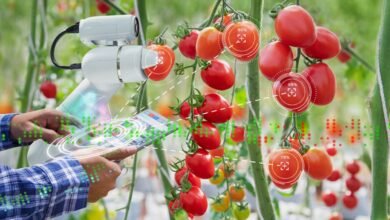The Impact of Sustainable Farming on Food Production

Introduction to Sustainable Farming
Sustainable farming represents a pivotal shift in how we approach agriculture and food production. Traditionally, agriculture has focused primarily on maximizing yields, often at the expense of environmental health and resource sustainability. Sustainable farming, however, emphasizes practices that are ecologically sound, economically viable, and socially responsible. This paradigm shift is not merely a trend but a crucial response to the increasing pressures on global food systems. By adopting sustainable farming practices, we can address several critical issues, including soil degradation, water scarcity, and biodiversity loss, all of which significantly impact food production.
Understanding Sustainable Farming Practices
Sustainable farming encompasses a wide range of practices designed to improve the efficiency of food production while minimizing negative environmental impacts. These practices include crop rotation, agroforestry, organic farming, and integrated pest management. Crop rotation involves alternating the types of crops grown on a particular piece of land to prevent soil depletion and reduce the buildup of pests and diseases. Agroforestry integrates trees and shrubs into agricultural landscapes, which can enhance biodiversity, improve soil structure, and increase water retention. Organic farming eschews synthetic pesticides and fertilizers in favor of natural alternatives, aiming to maintain soil fertility and support ecological balance. Integrated pest management combines biological, physical, and chemical tools to manage pest populations in a sustainable way.
These practices collectively aim to create a more resilient and adaptive agricultural system. By focusing on the health of the soil, the diversity of crops, and the reduction of chemical inputs, sustainable farming seeks to produce food in a way that can be maintained over the long term without depleting resources or causing harm to ecosystems.
Environmental Benefits of Sustainable Farming
One of the most significant impacts of sustainable farming on food production is its potential to improve environmental health. Traditional farming methods often lead to soil degradation, water pollution, and a loss of biodiversity. In contrast, sustainable farming practices are designed to mitigate these issues.
Soil health is a cornerstone of sustainable farming. Practices such as cover cropping and reduced tillage help to maintain soil structure, prevent erosion, and enhance soil fertility. Cover crops, such as legumes, can fix nitrogen in the soil, reducing the need for synthetic fertilizers. Reduced tillage minimizes soil disturbance, which helps to preserve soil organic matter and improve its water-holding capacity. These practices contribute to more resilient soils that are better able to support healthy plant growth.
Water management is another critical area where sustainable farming makes a difference. Traditional farming often leads to the overuse of water resources and the contamination of water bodies through runoff of fertilizers and pesticides. Sustainable practices, such as drip irrigation and the creation of buffer zones, help to conserve water and protect water quality. Drip irrigation delivers water directly to plant roots, reducing evaporation and runoff. Buffer zones, which are areas of vegetation planted around fields, help to filter out pollutants before they reach water bodies.
Biodiversity is also supported by sustainable farming practices. Traditional monoculture farming systems, where large areas are planted with a single crop, can lead to a loss of biodiversity and increase vulnerability to pests and diseases. Sustainable farming encourages the use of diverse cropping systems, which can support a wider range of beneficial insects, birds, and other wildlife. By maintaining diverse ecosystems, sustainable farming helps to promote natural pest control and pollination services, which are essential for food production.
Economic Implications of Sustainable Farming
The economic impact of sustainable farming on food production is multifaceted. On one hand, adopting sustainable practices can lead to higher upfront costs due to the need for new technologies and methods. However, these costs are often offset by long-term savings and benefits.
For instance, while organic farming may require more labor and initial investment in organic inputs, it can lead to higher market prices for organic products. Consumers are often willing to pay a premium for foods that are produced using environmentally friendly methods. Additionally, sustainable farming practices can reduce input costs over time. For example, reduced reliance on synthetic fertilizers and pesticides can lower overall expenditure on these inputs.
Moreover, sustainable farming practices can lead to increased resilience to market fluctuations and environmental stresses. Diversified cropping systems, for example, can reduce the risk of total crop failure due to pests, diseases, or extreme weather events. This resilience can help stabilize farm incomes and improve food security.
Furthermore, sustainable farming can open up new market opportunities and support local economies. As demand for sustainably produced food grows, farmers who adopt these practices can benefit from new market niches and direct-to-consumer sales. Farmers’ markets, community-supported agriculture (CSA) programs, and farm-to-table initiatives are examples of ways in which sustainable farming can create economic value and support local communities.
Social and Health Benefits of Sustainable Farming
Sustainable farming also has significant social and health implications. By promoting practices that are better for the environment, sustainable farming can lead to healthier communities and improved quality of life.
Healthier food systems are one of the key benefits of sustainable farming. Organic and sustainably produced foods are often free from synthetic chemicals, which can be beneficial for both consumers and farm workers. The reduced use of pesticides and antibiotics can help to lower the risk of chemical residues in food and reduce the potential for antibiotic-resistant bacteria.
Additionally, sustainable farming practices can enhance food security and support local food systems. By focusing on local and seasonal production, sustainable farming can reduce the carbon footprint associated with transporting food long distances. Local food systems also support community resilience by keeping resources within the local economy and building connections between farmers and consumers.
The social benefits of sustainable farming extend to improved working conditions and fair labor practices. Sustainable farming often emphasizes fair labor practices and the well-being of farm workers. This includes fair wages, safe working conditions, and respect for workers’ rights. By supporting ethical labor practices, sustainable farming contributes to a more equitable and just food system.
Challenges and Future Directions
Despite the many benefits of sustainable farming, there are several challenges that need to be addressed to fully realize its potential. One major challenge is the need for greater research and innovation to develop and refine sustainable farming practices. Continued investment in research can help to identify new technologies and methods that improve the efficiency and effectiveness of sustainable farming.
Another challenge is the need for policy support and incentives. Governments play a crucial role in promoting sustainable farming through policies, subsidies, and regulations. Supportive policies can help to lower the financial barriers for farmers adopting sustainable practices and create a more favorable market environment for sustainably produced food.
Education and training are also essential for the widespread adoption of sustainable farming. Farmers need access to information and resources to implement sustainable practices effectively. Extension services, farmer networks, and educational programs can provide valuable support and help to build capacity in sustainable farming.
Finally, consumer awareness and demand play a critical role in the success of sustainable farming. Increasing consumer understanding of the benefits of sustainably produced food can drive market demand and encourage more farmers to adopt these practices. Public education campaigns and consumer outreach can help to build support for sustainable food systems and promote more sustainable consumption habits.
Conclusion
The impact of sustainable farming on food production is profound and far-reaching. By prioritizing environmental health, economic viability, and social responsibility, sustainable farming practices offer a path toward a more resilient and equitable food system. The benefits of sustainable farming extend beyond individual farms to encompass broader environmental, economic, and social dimensions. As we face the challenges of a changing climate and growing global population, sustainable farming represents a crucial strategy for ensuring the long-term sustainability and security of our food systems. Through continued innovation, supportive policies, and increased consumer awareness, we can build a future where sustainable farming plays a central role in food production, benefiting both people and the planet.



